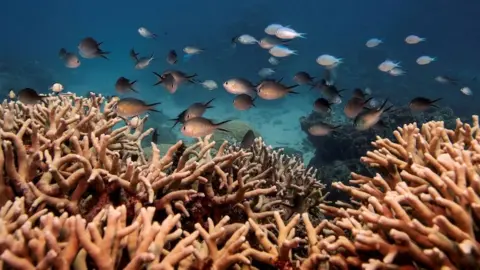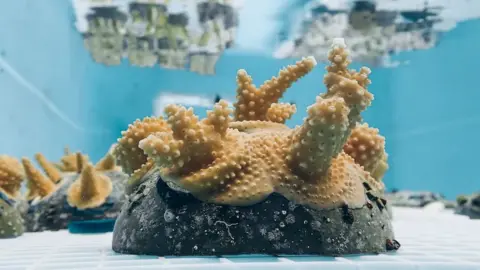Last month, Sir David Attenborough’s new film, Oceans, was released in cinemas.
It gave his lifelong perspective on the value of oceans.
“After living for nearly 100 years on this planet,” he says “I now understand that the most important place on earth is not on land but at sea and today we are living in the greatest age of ocean discovery.”
The film places the oceans as being at a crossroads, needing more action to help them continue as the “planet’s support system”.
Prince William shares that view.
He has made his admiration for Sir David, who was an inspiration for the creation of the Earthshot Prize, clear.
Sir David’s storytelling around the environment is a powerful asset in getting public attention and buy in – something the prince is acutely aware of.
 Reuters
ReutersThe visit to France is an insight into how Prince William sees his role in the environmental space and part of his development as a global statesman.
Also attending the forum in Monaco will be France’s President Emmanuel Macron and President Rodrigo Roblez of Costa Rica.
Why Monaco?
Because, over the coming days, gathered in this wealthy, tax haven, amid the super yachts and holidaying multi-millionaires, is some serious cash and investors willing to spend it on protecting marine life and the oceans they live in.
The prince’s speech and meetings will largely be in public on Sunday.
But he will also hold a closed, private session with experts and the investor community.
It’s a pragmatic approach to using his royal soft power to draw in people who have the resources to help generate change.
‘I have a job that should not exist’
Throughout his life, the King has used his platform to bring the conversation about the environment into the mainstream.
His son is now building on that, in his own way, to try to show that environmental solutions are worth the investment.
And the oceans can be a difficult sell.
The sheer scale of the work that needs to be done can make it less attractive to investors.
“I have a job that should not exist” is how Sam Teicher, the co-founder and chief reef officer of CoralVita often begins his pitches.
His business was the first winner of the million-pound Earthshot prize in 2021 for solutions to repair and protect oceans.
 CoralVita
CoralVitaCoralVita grows corals to restore dying reefs.
Of this year’s Earthshot nominations, only 9% have entered the “Revive Our Oceans” category.
“We are land creatures, it is out of sight and out of mind for a lot of people,” says Sam Teicher.
He will be in Monaco this weekend and describes his approach to raising money for his business as “trying to harness capitalism for good”, stressing that “you need to be genuine and maintain integrity, you don’t want to blue wash or green wash”.
And that strategy is working.
The BBC has learnt that CoralVita has just won funding of about £6m ($8.1m) with investors led by Builders Vision – a philanthropic organisation created by Lukas Walton, whose grandparents founded the Walmart chain in the United States.
It is one of the biggest funding offers for oceans work and will mean CoralVita can scale up and accelerate its restoration projects to help preserve the ocean’s biodiversity.